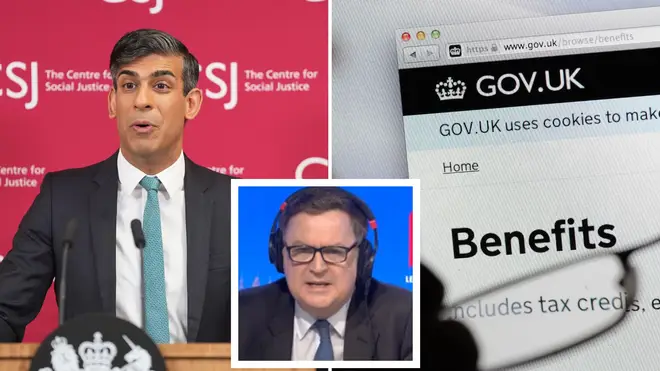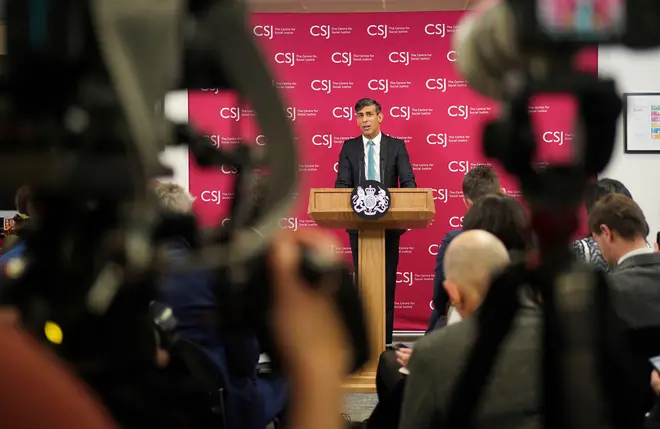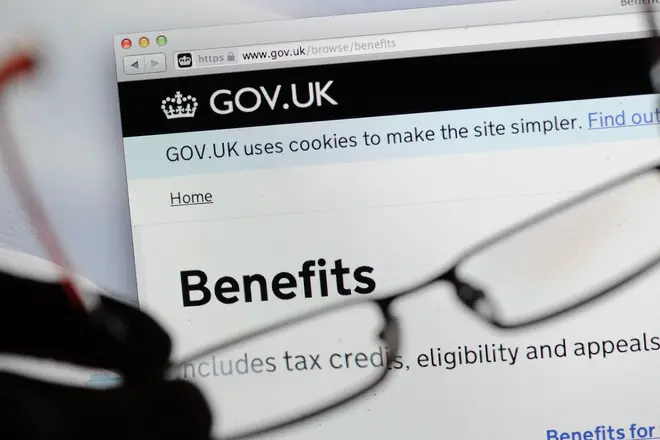
Shelagh Fogarty 1pm - 4pm
19 April 2024, 10:40 | Updated: 19 April 2024, 11:14

Rishi Sunak has called for an end to 'sick note culture', telling Britain ‘you don’t get anything in life without hard work’ as detailed government plans for a benefits crackdown.
Setting out his plans during a speech in London on Friday, the Prime Minister detailed his "moral mission" to stop "fraudsters" from exploiting "the natural compassion and generosity of the British people".
Waging war on those exploiting loopholes, the PM's proposed overhaul of the benefits system saw him reject suggestions that his welfare reforms lacked compassion.
The Prime Minister said: "Some people no doubt will hear this speech and accuse me of lacking compassion, of not understanding the barriers people face in their everyday lives.
Adding: "There is nothing fair about expecting taxpayers to support those who could work but choose not to."
Mr Sunak unveiled his vision for a "new welfare settlement for Britain" on Friday morning, pledging not to dismiss or downplay illness but calling for a "more ambitious" approach to helping people back to work.
However, the British Medical Association (BMA) has urged Rishi Sunak to avoid using a "hostile rhetoric on sicknote culture" following the announcement.

It comes as Work and Pensions secretary Mel Stride told Nick Ferrari at Breakfast on LBC: "We are absolutely staffing up" when asked about the government's proposed crack down on sick notes.
"In many cases it means actually just having a different configuration of existing resources," he said.
The Prime Minister set out the new fraud Bill ahead of the next parliament, describing how it will align the Department for Work and Pensions with HM Revenue and Customs in a bid to reduce benefits fraud.
He added that the new powers would allow the government to "make seizures and arrest" in certain instances, allowing "penalties" to be applied to those exploiting the system through a new civil penalty system.
"Because when people see others in their community gaming the system that their taxes pay, it erodes support for the very principle of the welfare state," Sunak said.
"This is not about making the welfare system less generous to people who face very real extra costs from mental health conditions.

'Enough is enough, is my message on this' says Mel Stride
"We actually want to make it easier to access, with fewer requirements," the PM said.
He added that the Government's "overall approach is about saying that people with less severe mental health conditions should be expected to engage in the world of work".
Rishi Sunak said an expected rise in benefits spending is "not sustainable".
In a statement following the announcement, Dr Katie Bramall-Stainer, chairwoman of GPC England, the BMA's GP committee, said: "Fit notes are carefully considered before they are written, and a GP will sign their patient off work only if they are not well enough to undertake their duties.
"We do recognise the health benefits of good work, and that most people do want to work, but when they are unwell, people need access to prompt care.
"With a waiting list of 7.5 million - not including for mental health problems - delays to diagnostics, and resulting pressures on GP practices, patients cannot get the treatment they need to be able to return to work."

The PM warned against "over-medicalising the everyday challenges and worries of life" during his speech on welfare reform on Friday.
He is expected to say the focus must shift to what work people might be able to do, amid concerns that some are being unnecessarily written off as sick and "parked on welfare".
Mr Sunak will add that there is a "growing body of evidence that good work can actually improve mental and physical health".
Last month, Work and Pensions Secretary Mel Stride faced criticism for saying there is "a real risk" that "the normal ups and downs of human life" are being labelled as medical conditions.
The Government's plans for getting specialist work and health professionals to issue fit notes will often mean "a different configuration of existing resources," the Work and Pensions Secretary said.
Mel Stride told Nick Ferrari at Breakfast on LBC: "We have already gone out to the various health boards around the country and we have 15 of the 42 in England who in the autumn will be participating in something called WorkWell, which is the name for what I described earlier of bringing together the medical assistance but also that critical work-based advice and support as well."
Mr Stride said a call for evidence launched on Friday will help determine "exactly what the model is and exactly how it will work," but broadly, a GP would send a patient with a bad back to WorkWell, where an advisor may contact their workplace to make adjustments such as relocating their office to the ground floor.

As part of the reform, Mr Sunak is announced a review of the fit note system, suggesting specialist work and health professionals should be charged with responsibility for issuing them instead of GPs.
It comes after recent NHS data showed almost 11 million fit notes were issued last year, with many being repeat fit notes "issued without any advice, resulting in a missed opportunity to help people get the appropriate support they may need to remain in work".
Mr Sunak is expected to refer to challenges presented since the pandemic, with the government saying a "significant number of working aged people have become inactive due to long term sickness which has in large part been driven by mental health conditions".
He is expected to say: “We don’t just need to change the sick note, we need to change the sick note culture so the default becomes what work you can do – not what you can’t.
“Building on the pilots we’ve already started we’re going to design a new system where people have easy and rapid access to specialised work and health support to help them back to work from the very first Fit Note conversation.
“We’re also going to test shifting the responsibility for assessment from GPs and giving it to specialist work and health professionals who have the dedicated time to provide an objective assessment of someone’s ability to work and the tailored support they need to do so.”
Since 2020, the number of people out of work due to long-term sickness has risen significantly, reaching 2.7 million people in January 2024.
A large proportion of those report suffering from depression, bad nerves or anxiety, although most of those report these as secondary conditions rather than the main one keeping them out of work.